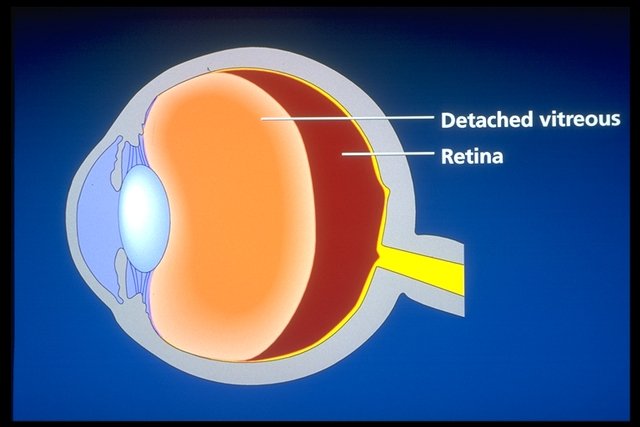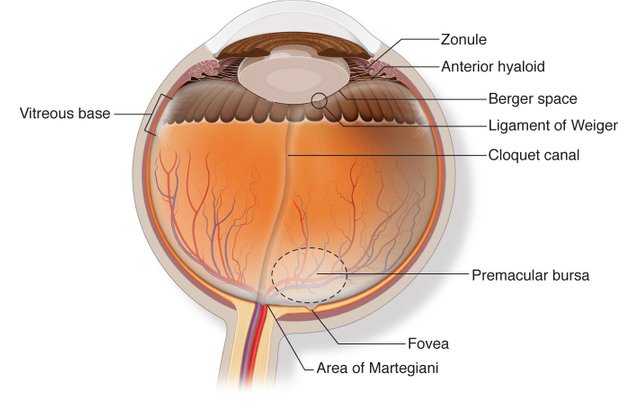The Vitreous Humor and Vision
Hello guys,
I hope you are all doing amazing and having a good time. For the past few days we have been learning about functions of parts of the eye and for those who have been following we have come a long way from the anterior part of the eye and has treated the sclera, conjuctiva, cornea, the lids and lashes.

For today we want to we want to start going into the eye, the interior part which one may need additional instruments to view, if you keep up you would be able to keep tabs and still comprehend though as we wouldn't make it complicated such that one would get confused. I hope you enjoy the read and that you also have fun reading.
The Vitreous
The vitreous is jelly-like liquid or substance that is found within the eye or inside the eyeball. It can be found behind the crystalline lens and tends to fill the entire space of vacuum between the lens and the retina (the part of the eye responsible for phototransduction). This area or spaces adds up to majority of the entire length of the eyeball.
The vitreous is an important component when it comes to vision and things or pathologies affecting the viterous tends to have detrimental effect on vision owing to the fact that it lies within the transparent media path through which light focused by the lens and the cornea are brought to the retina for vision. Which means that should it become opaque or translucent or anything else aside it's natural start light passage may be impede or affected and vision may also be affected.

The vitreous sometimes get's inflamed in a condition known as vitritis during which the media becomes hazy and or dense keeping light form passing through smoothly, when this happens vision is drastically reduced and when inflammation is not controlled permanent detriments could set in, it may affect others structures also causing scars formation.
These may be caused by microbes who end up in the eye through surgical means and other procedures that may be invasive to the eye. Another common condition that one may come about when they take a look at the vitreous is the liquefaction process. As i already stated above, this is jelly-like substances that fills the vacuum and so when this jelly-like nature tends to change to more water during the senile process it sometimes causes symptoms and other conditions equally dangerous to vision and sight.
The liquefaction process tends to result in what we call posterior vitreous detachment which may also result in tractional retinal detachment which is the more dangerous of the two owing to the fact that it is an emergency condition which not dealt with within a short period of time would result in permanent loss of vision or blindness since the cells of the retina would die off.
Functions
From what we have talked about above i am sure you are already guessing some of the functions that this part of this substances could be performing or adding up to the eye in relation to vision and general health of the eyeball. Anyway if you are able to get some of them, thumbs up if you weren't able to, we are all here to learn.

So the vitreous fills that vacuum of space behind the lens as already mentioned and this keeps the eyeball in place, turgid and rigid as it ought to be this keeps it from caving in. The nature of the vitreous also enables the eyeball to be able to withstand some amount of impact just like how a hydraulic would work for your can.
It been a part of the transparent media for refraction of light to the retina it also add up to the refraction process although it doesn't do much as compared to the cornea and lens but it also has a part to play and it remaining transparent also adds up to the visual pathway working correctly as it ought to.
Conclusion
And so the next time you visit your optometrist and your vision is not clear pay particular attention to what he or she tells you, your vitreous may not be clear as it ought to anymore and through our lessons here you may be able to relate better.

I hope this writeup finds you well and i hope you learnt a thing or two from here. Thanks for your time and many thanks to all and sundry. Thanks for your time.
@nattybongo - SFAAO
optometrist/teaching & research assistant, knust
References
Yadav, I., Purohit, S. D., Singh, H., Bhushan, S., Yadav, M. K., Velpandian, T., Chawla, R., Hazra, S., & Mishra, N. C. (2021). Vitreous substitutes: An overview of the properties, importance, and development. Journal of biomedical materials research. Part B, Applied biomaterials, 109(8), 1156–1176. https://doi.org/10.1002/jbm.b.34778
Sebag J. (2018). Posterior Vitreous Detachment. Ophthalmology, 125(9), 1384–1385. https://doi.org/10.1016/j.ophtha.2018.05.018
Milston, R., Madigan, M. C., & Sebag, J. (2016). Vitreous floaters: Etiology, diagnostics, and management. Survey of ophthalmology, 61(2), 211–227. https://doi.org/10.1016/j.survophthal.2015.11.008
Great teachings Bro. Thanks for much for taking us through how we can protect our eyes from damaging.
Thanks for reading
Hello sir here is my achivement 5 task 3 post please verify it
https://steemit.com/hive-172186/@ngamd/achivement-5-task-3-by-ngamd-review-steemyy-com
Oh yhes mine has not been verified too
There have been some changes to the greeter work and so please bare with leaders
Wow too much information about the eye. By the way i love the picture i hope you will dash me your scrubs😆😆😆
Haha, my scrubs won't fit you oo, I'm very slim anyway thanks for reading and thanks for your time
Thank you for this vital information. Keep sharing
Thank you for reading